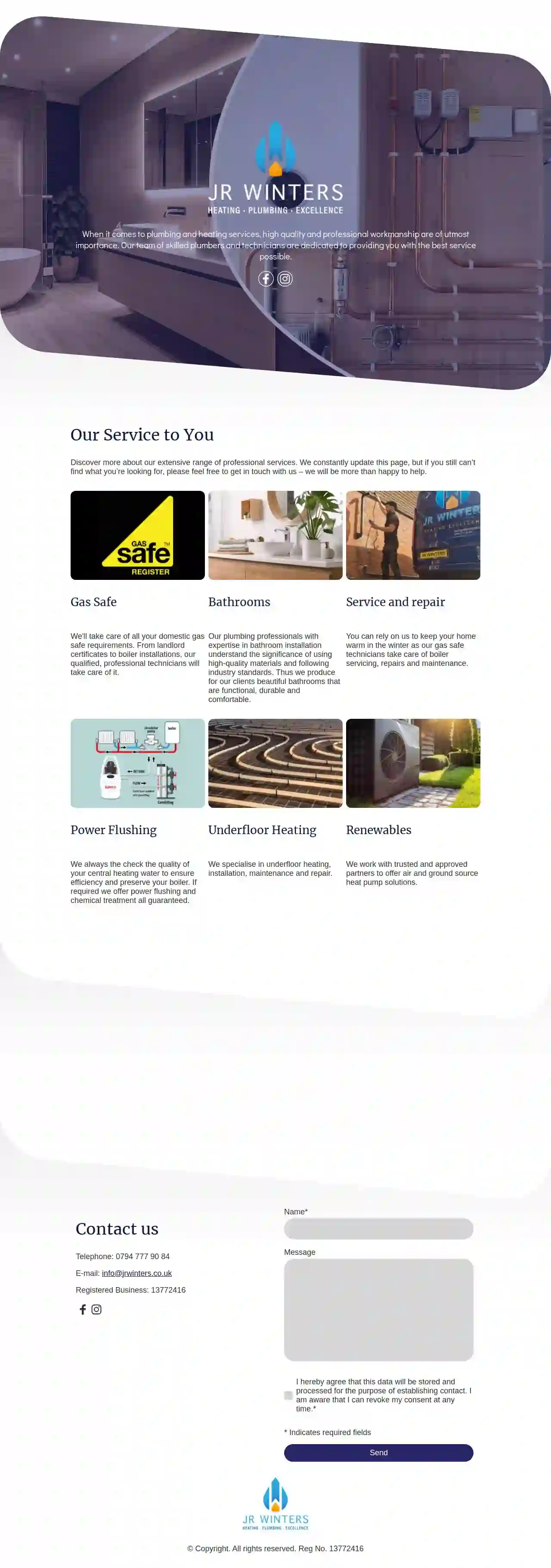HVAC Companies Stoke Poges
Find the best HVAC Companies in Stoke Poges
Get up to 3 HVAC Companies quotes for your project today! Compare profiles, reviews, accreditations, portfolio, etc... and choose the best offer.

Durotan Ltd
4.84 reviewsBuckingham, Buckinghamshire, West House, West Street, MK18 1HE, GBWelcome to Durotan Ltd, specialist suppliers and installers of pre-insulated steel or PEX heating and cooling distribution pipes. Established in 1978, we are the oldest and most experienced specialist in plastic cased medium and low temperature pre-insulated pipe systems in the UK and Ireland. We have been involved in more than 5000 projects across a broad spectrum of clients in both public and private sectors. Our experience has taught us that success lies in offering a tailored service to suit each client and each project. Our dedicated team is constantly on hand to provide the most cost effective, best value and pragmatic solution to any project, ensuring client expectations are met and exceeded.
- Services
- Why Us?
- Accreditations
- Testimonials
- Gallery
Get Quote
Sidney Cubbage (Heating & Ventilating) Limited
51 reviewsRiverside West, Wooburn Green, Unit 6, The Courtyard, HP10 0DG, GBSidney Cubbage (Heating & Ventilating) Limited is a Buckinghamshire based company specialising in Building Engineering Services within commercial, industrial and high end residential installations. We offer a full in-house service including Design, Engineering and Project Management for the integration of Heating, Chilled Water, Air Conditioning, Ventilation, Domestic Water Systems, Above Ground Drainage and Building Management Systems using the most innovative technological equipment available, culminating in the production of record documentation and handover to the client. Our staff personnel are all trained within the industry, the company carries out regular staff training in a wide spectrum of subjects ranging from water regulations and pressurisation to contract law. We are CHAS and Builder’s Profile accredited, Gas Safe and REFCOM approved and have partnerships with both Daikin and Mitsubishi.
- Services
- Why Us?
- Accreditations
- Gallery
Get Quote
Chiltern Air Management
53 reviews4 Meadow View Crendon Ind. Park, Aylesbury, HP18 9EQ, GBOver 75 Years Experience within the mechanical, electrical and building services industry Call today: 01844 202 776 We are specialists in the design, manufacture & installation of ductwork. Bespoke Ductwork Design Ductwork Manufacture & Installation Learn More Fire Rated Ductwork Find out More Bespoke Ductwork Design Ductwork Manufacture & Installation Learn More UV-C In-Duct Sterilising Units for FCU's Find out More Ventilation Learn More Mechanical Pipework Find Out More Heating & Water Click Here With senior management having over 75 years of experience between them within the mechanical, electrical and building services industry, they are able to pool resource to provide the optimum solution. Direct Contact Phone 01844 202 776 Email [email protected] Chiltern Air Management 4 Meadow View Crendon Ind. Park Aylesbury Buckinghamshire HP18 9EQ Contact Us Name Email Address Phone Company Name Comment/Question Submit © 2005 - 2023 Chiltern Air Management Registered in England No: 05405057 Website by Giraviu
- Services
- Why Us?
- Gallery
Get Quote
PS HVAC LTD
52 reviews17a Dresser road, Prestwood, HP160NA, GBPS HVAC Ltd have over 20 years combined experience of installing air conditioning and refrigeration systems. We can offer supply and installation on a full range of air conditioning systems including VRV, VRF, split units, AHU. We pride ourselves on providing an excellent quality service, which comprises a high-quality standard of work and an excellent customer experience. PS HVAC Ltd offer a full repair service for your system. We offer a fast and professional air conditioning and refrigeration repair service for domestic or industrial equipment. We offer fully qualified engineers and a rapid response time. PS HVAC Ltd has extensive experience of maintaining air conditioning systems. Our air conditioning servicing engineers carry out a full and effective maintenance and keep up to date record sheets of your system.Regularly servicing and maintaining your air conditioning system will always: Increase lifespan of equipment Significantly reduce the running costs of your system Ensure warranties are honoured PS HVAC Ltd Prestwood, 17a Dresser road, HP160NA Company Registration Number - 10793746 England Web : www.pshvac.co.uk
- Services
- Why Us?
- Gallery
Get Quote
Heathcrest Heating Services Ltd
Station Road, Buckinghamshire, Heathcrest House, Buckingham, HP19 8HH, GBHeathcrest Heating Services Ltd is a commercial and industrial heating and hot water systems company that supplies, installs, and maintains industry-leading Powrmatic, Combat, and Stokvis equipment throughout the Home Counties, Greater London, and adjacent areas. We are your local experts for commercial heating, energy management, factory heating, warehouse heating, office heating, church heating, nursing home heating, radiant heating, heating engineers, heating maintenance, gas burners, oil burners, warm air heating, energy conservation, heating design service, and commercial gas engineers. We also offer a wide range of services, including equipment and parts for air heaters, boilers, water heaters, burners, pool heaters, plate heat exchangers, pumps, and more. Our team of experienced engineers is dedicated to providing high-quality solutions for all your commercial heating needs.
- Services
- Why Us?
- Accreditations
- Gallery
Get Quote
JR Winters Ltd
51 reviewsAylesbury, GBWhen it comes to plumbing and heating services, high quality and professional workmanship are of utmost importance. Our team of skilled plumbers and technicians are dedicated to providing you with the best service possible. Our Service to YouDiscover more about our extensive range of professional services. We constantly update this page, but if you still can’t find what you’re looking for, please feel free to get in touch with us – we will be more than happy to help.
- Services
- Why Us?
- Gallery
Get Quote
Heat Pump installation
Office 13, 52 Edison Road, Aylesbury, HP19 8TE, GBHeat Pump Installs is a company dedicated to providing reliable and efficient heat pump installation services. We understand the importance of energy efficiency and sustainability, and we strive to offer solutions that help our customers reduce their environmental impact while saving money on their energy bills. Our team of experienced engineers is highly skilled in installing a wide range of heat pump systems, including air source, ground source, and hybrid heat pumps. We work closely with our clients to understand their individual needs and provide tailored solutions that meet their specific requirements. We are committed to delivering exceptional customer service and ensuring that our clients are completely satisfied with our work. Heat pumps are a highly efficient way to heat and cool your home, transferring heat from the outside air or ground to provide warmth in the winter and coolness in the summer. They can significantly reduce your energy consumption and carbon footprint compared to traditional heating systems. At Heat Pump Installs, we offer a comprehensive range of services, from initial consultation and system design to installation, commissioning, and ongoing maintenance. We use only high-quality components and adhere to the highest industry standards to ensure the reliability and longevity of our installations. We are proud to be a trusted partner for homeowners and businesses looking to make the switch to a more sustainable and cost-effective heating solution.
- Services
- Why Us?
- Testimonials
- Gallery
Get Quote
Emergency Plumbing & Heating Direct
56 reviewsLondon End, Old Kings Head House, Bucks, HP9 2HN, GBEmergency Plumbing & Heating are your local same day Plumber in Maidenhead SL6. From leaks to boiler repairs, Call us today and get an engineer today. With 20 years of experience and ex British Gas trained engineers, we are your local plumber Beaconsfield and the only choice for many residents when a problem arises. Fast, Local plumbing and heating engineers and we are available the very same day at no extra cost. The number one local plumber Beaconsfield HP9 covering Seer Green HP9, Beaconsfield HP9, Knotty Green HP9, Jordons HP9.
- Services
- Why Us?
- Testimonials
- Gallery
Get Quote
Heatify Ltd
4.713 reviews159 Cambridge Street, Nithsdale House, Aylesbury, HP20 1BQ, GBWe're based in the heart of Buckinghamshire, offering a wide range of gas, heating and air conditioning services in Aylesbury and the surrounding areas. As well as being fully insured, our engineers are Gas Safe registered, F-GAS & Heat Geek certified, so no matter the size of the job, we have the know-how to tackle it. Did you also know that our work comes with a guarantee? So whether you're looking for a Gas Safety Certificate or a large-scale central heating installation, we're here to help.
- Services
- Why Us?
- Accreditations
- Gallery
Get Quote
Boiler Installation In High Wycombe
51 reviewsPlomer's Hill, High Wycombe, HP11 1AA, GBBoiler Installation In High Wycombe is a seasoned expert in boiler installation services, offering new boiler cost and installation, building regulations for boiler installation, and electric boiler installation services. We help customers round-the-clock, providing boiler installation services such as boiler installation certificate, boiler installation, and boiler installations in High Wycombe, Buckinghamshire, in the South East of England. Our team is dedicated to providing top-notch services, ensuring customer satisfaction and peace of mind.
- Services
- Why Us?
- Gallery
Get Quote
Over 12,692+ HVAC Contractors on our directory
Our HVAC companies operate in Stoke Poges and surroundings!
HVACCompaniesHub has curated and vetted Top HVAC Businesses near Stoke Poges. Find a top & reliable business today.
Frequently Asked Questions About HVAC Companies
- Split Systems: The most common type, consisting of an outdoor unit (condenser/compressor) and an indoor unit (air handler/furnace).
- Heat Pumps: Provide both heating and cooling by transferring heat between indoor and outdoor air.
- Ductless Mini-Splits: Ideal for homes without existing ductwork or for adding heating and cooling to specific zones.
- Packaged Units: A single unit that contains all the system's components.
- Geothermal Heat Pumps: Use the earth's stable temperature to provide highly efficient heating and cooling.
- Experience: Choose a contractor with extensive experience in the HVAC industry, especially in the type of service you need.
- Licensing and Insurance: Verify that the contractor is properly licensed and insured.
- Certifications: Look for NATE (North American Technician Excellence) certification, which indicates a high level of technical competency.
- Reputation: Check online reviews and ratings to assess the contractor's reputation and customer satisfaction levels.
- References: Ask for references from past customers and contact them to inquire about their experience.
- Estimates and Quotes: Get written estimates or quotes from multiple contractors to compare pricing and services.
- Warranty Information: Ask about warranties on equipment and labor.
- Communication: Effective communication is key. Choose a contractor who responds promptly and clearly answers your questions.
What are the different types of HVAC systems?
How do I choose the right HVAC contractor?
How often should I have my HVAC system serviced?
What is a ductless mini-split system?
What are the different types of HVAC systems?
- Split Systems: The most common type, consisting of an outdoor unit (condenser/compressor) and an indoor unit (air handler/furnace).
- Heat Pumps: Provide both heating and cooling by transferring heat between indoor and outdoor air.
- Ductless Mini-Splits: Ideal for homes without existing ductwork or for adding heating and cooling to specific zones.
- Packaged Units: A single unit that contains all the system's components.
- Geothermal Heat Pumps: Use the earth's stable temperature to provide highly efficient heating and cooling.
How do I choose the right HVAC contractor?
- Experience: Choose a contractor with extensive experience in the HVAC industry, especially in the type of service you need.
- Licensing and Insurance: Verify that the contractor is properly licensed and insured.
- Certifications: Look for NATE (North American Technician Excellence) certification, which indicates a high level of technical competency.
- Reputation: Check online reviews and ratings to assess the contractor's reputation and customer satisfaction levels.
- References: Ask for references from past customers and contact them to inquire about their experience.
- Estimates and Quotes: Get written estimates or quotes from multiple contractors to compare pricing and services.
- Warranty Information: Ask about warranties on equipment and labor.
- Communication: Effective communication is key. Choose a contractor who responds promptly and clearly answers your questions.